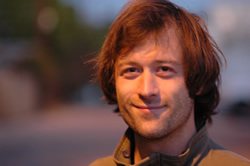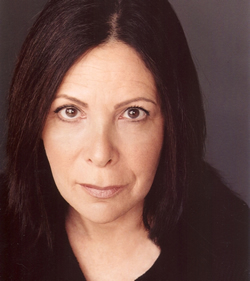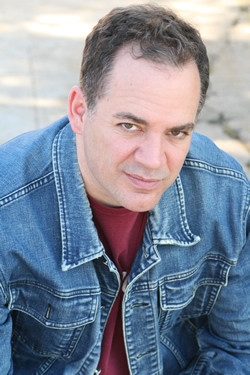Interview
Three Talents Risk It All for A Good Smoke
Don Cummings’ A Good Smoke, now playing at the Chandler Studio Theatre in NoHo through March 29, is a hot ticket. One of the reasons is the presence of musician/actor Henry Gummer, the son of icon Meryl Streep and a fine actor in his own right. He studied acting professionally at NYU Graduate School, and like his famous mom, at Yale. Another is due to the powerful performance of actress Barbara Gruen, so dynamic in John Ireland’s play and film Johnny Moran, no stranger to the movie festival circuit both here and abroad, and at the Falcon Theatre several seasons ago in the critically acclaimed Johnny Boy. Yet another reason is that A Good Smoke is a world premiere for former actor Cummings, who has been work-shopping his plays to fine success in New York as well as LA. When we sat down recently on the set of the play, artists Gummer, Gruen and Cummings discussed their careers and offered some candid observations on the complexities of A Good Smoke.

Henry Gummer, son Dave
Q: What is your take on your character?
HG: Overall, he’s someone who has very deep convictions. He has a good sense of humor, and I think he has a chip on his shoulder. Generally, he thinks he sees the reality of what’s going on in this house, whereas everyone else has this complacent attitude about mom. They kind of let her act out and don’t question it or try to help her or help themselves. They’re sort of stuck.
Q: Dave broke away. Why?
HG: For a lot of reasons, he had to get away. If you’ve ever been to upstate New York, it’s pretty, but a small town…
Q: I’m from Massachusetts originally.
HG: Oh, you are. It’s like Pittsfield. Dave needed to get away, which he did.
Q: Dave speaks for the playwright, correct?
HG: Right. He provides a window of clarity in this whole play.
Q: Is Dave happy with his break? Is he happy in LA?
HG: No, he’s a workaholic and uses that to cope with what’s going on in his life. His wife has recently left him, probably because he sees the worst in people and doesn’t understand why
everyone can’t be better, as he imagines they could be. It’s kind of hard to live with someone that is constantly passing judgment. Like his mom, he’d be a tough father.
Q: Do you think Dave is like his mother?
HG: Definitely. That’s the great thing in the play; they’re the most alike. When mom gets in the picture, and they start going at each other, it blows up; it’s out of control.
Q: Tell me about your last play Journey to Dollywood at the Matrix.
HG: It was cool. It was much more fanciful in a way. It was sort of a weird mixture: we played it pretty naturalistically, but the play was much less realistic. The character in that play was closer to my personality. I played a musician. It’s funny, because I auditioned for it after being here for 4 months and after I’d driven across the country from New York and moved here. And the character is a musician driving across the country on his way to move to the city.
So it’s cool doing this (Smoke), where I can conceive the character, a little bit more apart from myself.
Q: I did my homework and I went to myspace.com, to your site and listened to one of your songs “Stop the Train”. Surprisingly, I liked it. I don’t like a lot of current pop music. How would you describe your music and your band?
HG: The influences we have right now go across the board, but we’re focusing on music from the early 70s and early 60s.
Q: You sound a little bit like Bruce Springsteen.
HG: Yeah. I have a low tenor voice. The songs we’re writing are more traditional structures, not the pop rock that has been sort of dominant for so long. We’re trying to focus on writing well-made songs, deliberately kind of simple… in the lyrics. They’re really about a specific thing rather than being esoteric.
Q: So, your life is going in 2 different directions: music and acting. Which do you prefer?
HG: I’m a musician who acts, not an actor who plays music. It took a long time for me to decide. The time devoted to one takes time away from the other, so in moving out here and starting this new group, really what I’m focusing on is music. I’ve been really lucky. The opportunities with the plays have come up serendipitously… without me having to seek them out.
Q: Mike Nichols directed you in a film, right?
HG: No, that was a play in Central Park.
Q: How did you like him as a director?
HG: He was amazing. He’s very hands off. The actors were incredible, so a lot of it was refining what they were coming up with, which, for the most part, was brilliant. It was one of the greatest learning experiences about art and life I’ve ever had.
Q: Didn’t DeNiro direct you as well?
HG: Yeah. That was the movie The Good Shepherd. It was a tiny part; I had just a few lines; he said a couple of words to me the whole time.
Q: Who has been the biggest influence in your life so far?
HG: My parents, I guess.
Q: Do you mind talking about that? We love your mother. She’s an inspiration to us all.
HG: She loves this play; she came to see it.
Q: I recently watched the TV film First Do No Harm rerun on Lifetime. She was so intense and real in that. You felt such sympathy for the parents and their epileptic little boy. Didn’t she give up her salary to make it?
HG: That was pretty much pro bono.
Q: So, what has she taught you as an actor?
HG: When my mom talks about acting, I listen. She says, “Be who you are, know what you know. When you get onstage and sit in the chair… really sit in the chair”.

Barbara Gruen, the mother Joyce
Q: How would you describe Joyce?
BG: She’s an addict, an unhappy woman. She’s had an unhappy childhood. Things never worked out; she has a lot of rage, which she aims at her children. She’s also narcissistic.
Q: How does she compare to Skinny Alice in Johnny Moran?
BG: Skinny Alice let herself be victimized by a lot of people, because she had no self-esteem, whatsoever. I think Joyce is tough. She had to be tough, because she was victimized as a kid. She got tough, but Skinny Alice never did. She went with the flow: “So, this is who I am, a punching bag. And that’s what I’ll be.” When Joyce toughened up, she pushed down her true feelings. Some of her angst comes out in the long monologue, but most of the time she just pushes down the real pain and lashes out.
Q: I noticed some really good positive changes in the performance this afternoon.
BG: I’m having more fun. It’s a fantastic part. This kind of role doesn’t come along in a new play very often…for women. Maybe years ago, but not today. This is an amazing part that Don (Cummings) has written. I’m so honored and privileged and happy to play it. I knew when I read it, I could do it. Sometimes, you just know.
Q: You’re good with edgy roles. Do you prefer them?
BG: I do. I think with Skinny Alice, she’s kind of sad too. She showed a lot of vulnerability, which Joyce doesn’t show much of.
When Joyce cries, it’s to be manipulative. She wants attention.
Q: What is your dream role? Do you have one?
BG: I used to think it was Martha in Who’s Afraid of Virginia Woolf? that…I really, really, really wanted to play. And I’ve worked on a few of the pieces and… I still like it a lot. Also,
The Goat, or who is Sylvia? I love Albee. I also love Beckett. This play reminds me of Albee, the way the characters interact with each other, the edge of it…the humor. Don’s a great writer
and director.

Don Cummings, playwright and director
Q: Is your play autobiographical?
DC: The true thing in the play is: my parents really do smoke. Another big issue was when my sister did have a baby…my mother is on Oxycom for fibromyalgia and she really did go off her medication and have withdrawal in the hospital for one night. The rest is not true, because a week later my mother did get on a plane and went to New Jersey to help my sister. I never went back to the East Coast like Dave. I actually lived in Santa Barbara. Instead of visiting my mother in Florida or my sister in New Jersey, I wrote a one-act play about basically me going home and confronting this whole thing, “Forget this. I’m not dealing with you. I’m leaving.”
Q: If you were an actor, how did you happen to make Dave an environmentalist?
DC: I have a degree in biology. I’m a blogger and write about the environment a lot.
Q: You had a fascination with crabapple trees?
DC: Where I grew up, in the summers in New York, there were a lot of old apple orchards. They’re so functioning. I remember some times, when I needed to get away from my family, I used to go to this one orchard in the winter, and it was beautiful. Bare apple trees. I’d go up there and just stare at them, they’re so beautiful.
Q: How many plays have you written?
DC: I’ve written 5 full plays and 3 one-acts.
Q: Did Henry Gummer first read for you in New York?
DC: Yes, but not for this. He did The Fat of the Land at Ensemble Studio Theatre for director Billy Hopkins, who’s a big deal casting director there. He read the part of a gay ballet dancer. He was so sweet. The thing about Henry, when you’re with him and talk to him, you feel warm and good. I fell in love with his energy and who he was, so he became my first choice for this. He is able to bring all that sweetness on to the stage and he gives it to people, and everyone feels it.
Q: What about Barbara Gruen?
DC: I’m the luckiest man alive. Without a strong actress, can you imagine what this play would be like? I watched a video clip of Barbara in Johnny Moran and thought she was amazing. I thought she’d be great for Joyce, so I did a background check. I called casting director Michael Donovan, who knew her. The funny thing is she was the first to audition for this play and gave an incredible reading. I was so relieved that she showed up. Barbara brings her entire self to it. A lot of actors can’t do that. She brings complete reality. It’s a really difficult part, and she’s a dream to work with.
Q: What is the main message in the play? What should audiences take away with them?
DC: It’s about forgiveness and acceptance. People want everyone to get better quickly and to get their shit together and become amazingly evolved human beings. It’s about Dave accepting his mother for who she is. And it’s about all of us accepting people for who they are, no matter how messy they are. To also know that underneath, no matter what someone looks like to you, that they always have something that is absolutely incredible. The fact that Joyce is the character that saves the baby… that’s what it’s about: in every monster, there’s an angel.
Don’t miss A Good Smoke at the Chandler Studio Theatre in NoHo now through March 29, playing Fridays and Saturdays at 8pm & Sundays at 3pm. No performance March 23, Easter Sunday.
Call 310-869-7546 or 1-800-838-3006 or visit www.theprodco.com, for reservations.